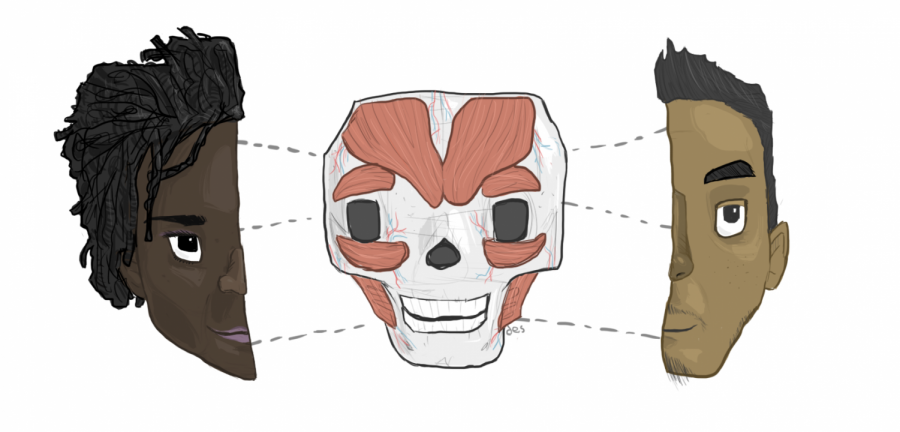Latino and Black Animosity
The anatomy of racism: we are all the same on the inside.
January 30, 2018
Growing up in a Mexican and Salvadorian household, I always hated hearing certain family members making racist remarks about black people. At a young age I didn’t know why it bugged me so much. As I grew older and learned about racism in school, I realized why it made me so angry and how wrong it truly was for them to make such nasty comments.
Unfortunately, racism towards black people is prevalent within all races but as a Latina myself, I’ve witnessed firsthand the racist way many Latinos speak about black people. I’ve even spoken about this topic with my Latino friends. Many of them said that several or even most family members, whether it be their parents, siblings, aunts, uncles, cousins, have made racist remarks towards black people.
Like I said before, I know that there’s racist people all over the world, but in the Latino community, this hatred is never discussed openly despite it being so common. I’ll even admit that when I hear a family member say something racist, I choose to ignore it, even though it makes me angry, in order to avoid an argument.
When you think about it, it makes no sense for Latinos to be racist to black people. As minorities we shouldn’t bring each other down in such an ugly way, especially in this political climate. Because the President is constantly speaking poorly about minorities, his supporters think it’s okay to follow in his footsteps. People who voted for Donald Trump are starting to believe that it’s okay to be explicitly racist simply because it’s what their president is doing.
In a Nov. 25, 2007 article by political analyst Earl Ofari Hutchinson for the Los Angeles Times, he wrote “Animosity between Latinos and blacks is the worst-kept secret in race relations in America. For years, Latino leaders have pointed the finger of blame at blacks when Latinos are robbed, beaten and even murdered. Blacks, in turn, have blamed Latinos for taking jobs, for colonizing neighborhoods, for gang violence.” This article was written almost 10 years ago and it is still extremely relevant. It is a shame that not much progress has been made in race relations since this article was written.
Even the smallest action could put an end to this internalized racism. Venice High is even taking a step forward during Black History Month with an assembly run by the Black Student Union with the help of M.E.Ch.A. They will be honoring African-Americans in their themed assembly ¨Change through Unity” where both clubs will be performing and displaying a variety of poems, songs and traditional dances.
This assembly is a step in the right direction. Latino teens can do their own part by showing their family members that black people are people too. Or at least encourage their family members not to make racist remarks. Sometimes people’s views are influenced by a bad experience but that shouldn’t color their view of an entire community. At the end of the day, we should all uplift each other rather than put each other down.









 Watch the full video o
Watch the full video o







![Taylor Swift’s newest album titled Midnights 🌙 takes a deeper look at the persona of Taylor herself, and according to reporter Alina Miller, although this isn’t Taylor’s best work, there are highlights worth mentioning about. 💫
Click the link in the bio to check out the full article!
[Photo Caption: Taylor Swift hits all top 10 spots on Spotify’s Billboard Top 100 chart]
#taylorswift #midnights #tiktok #antihero #spotify](https://scontent-iad3-1.cdninstagram.com/v/t51.29350-15/314744727_1556543814822641_1643591421920256829_n.jpg?_nc_cat=110&ccb=1-7&_nc_sid=8ae9d6&_nc_ohc=aDxNzq2snTYAX_gAl0G&_nc_ht=scontent-iad3-1.cdninstagram.com&edm=ANo9K5cEAAAA&oh=00_AfBa4EluVzZT-7d5rKyT6tLJo0UJuCvRJPSCMX71aeO38Q&oe=63965890)



 Watch the full video
Watch the full video 

Mexican Dude not racist • Jan 31, 2018 at 7:56 AM
You got it wrong esa. Latinos are not racist towards blacks. There is hate towards them but not because of their color of skin. Its because of the way they behave. My Mexican parents are cool with our Black neighbors ever since I was a child. Yes I did hear them say bad things about Blacks but never about their color of skin. Latinos hate anyone that is evil and does bad things. So if theyre White,Brown,Yellow, Purple,Red,Black,Grey or who gives a damn and they are evil and bad, Latinos will hate you of course but never because of skin color. Get that right. I had black friends inside my house. My mom would give them food and treat them nice. Plus its not like Blacks dont say bad things about Latinos. Bet you they dont hate us because we are “brown skins”. Its mostly because of the gang wars between Black and Brown on the streets and prisons. Plus did your parents go to school with black people or even grow up around them? They probably talked bad about them because of movies or the news or because they stole your dads stereo. Leave that racist bull to the KKK who really hate you for your skin color. Keep my Latinos off that mouth.
Ruben Botello • Jan 30, 2018 at 6:10 PM
Divide and conquer is what it’s all about. The real racists love to see Blacks and Latinos fighting each other, to keep us down. Blacks and Latinos do need to learn how to get along, but it’s very difficult when White racists keep pitting us against each other. People aren’t born racist, they are taught it.